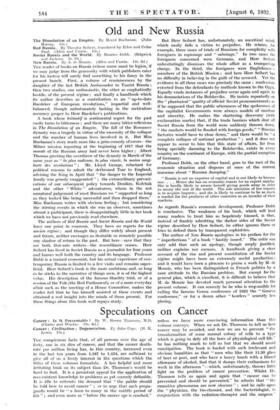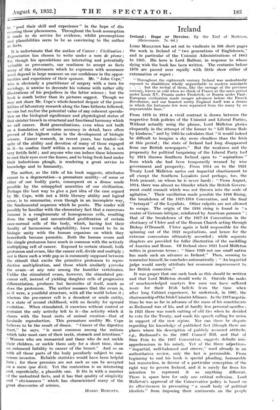Speculations on Cancer
Cancer : Is It Preventable ? By W. Brown Thomson, M.D. (Chatto and Windus. 16s. 6d.) Cancer : Civilisation : Degeneration. By John Cope. (H. K. Lewis. 15s.)
Time conspicuous facts that, of all persons over the age of forty, one in six dies of cancer, and that the cancer death- rate per million living has, in this country, increased even in the last ten years from 1,187 to 1,454, are sufficient to give all of us a lively interest in the questions which the titles of these volumes formulate. A less helpful and more irritating book on its subject than Dr. Thomson's would be hard to find. It is a persistent appeal for the application of non-existent knowledge to problems as yet scarcely definable. It is idle to reiterate the demand that "the public should be told how to avoid cancer" ; or to urge that such propa- ganda would be "a boon to many in the middle period of life " ; and even more so "before the cancer age is reached,"
unless we have more convincing information than this volume conveys. When we ask Dr. Thomson to tell us how cancer may be avoided, and how we are to prevent "the transformation of some normal colony of cells to a type which is going to defy all the laws of physiological cell life," he has nothing much to tell us but that we should avoid constipation. The book is loaded with such irrelevant and obvious banalities as that "men who like their 11.30 glass of beer or port, and who have a heavy lunch with a liberal allowance of alcohol, find that it damps their enthusiasm for work in the afternoon "—which, unfortunately, throws little light on the problem of cancer prevention. Whilst Dr. Thomson tells us again and again that "cancer can be prevented and should be prevented," he admits that the causative phenomena are now obscure " ; and he calls upon the "physician, the bio-chemist, and the bacteriologist, in conjunction with the radiation-therapist and the surgeon
to
"pool their skill and experience" in the hope of dis- covering those phenomena. Throughout the book assumption is made to do service for evidence, whilst presumptions and plausibilities seem to be as convincing to the author as facts.
It is unfortunate that the author of Cancer : Civilisation : Degeneration has chosen to write under a nom de plume ; for, though his speculations are interesting and potentially valuable as provocants, our readiness to accept as facts many of the statements which he expresses with assurance must depend in large measure on our confidence in the oppor- tunities and experience of their sponsor. Mr. "John Cope," who is obviously a practitioner of surgery with a turn for sociology, is -unwise to decorate his volume with rather silly illustrations- of his prejudices in the latter science ; but the book is much better than its pictures- suggest. Though we may not share Mr. Cope's whole-hearted despair of the possi- bilities of laboratory research along the lines hitherto followed, we can but realize the potential value of any coherent specula- tion on the biological significance and physiological status of that sinister breach in structural and functional harmony which we call cancer. Bold generalizations, even when not built on a foundation of uniform accuracy in detail, have often proved of the highest value in the development of biologic science. Cancer research, in recent years, has tended—in spite of the ability and devotion of many of those engaged in it—to confine itself within a narrow and, so far, a not very fertile field ; and anyone who can induce these labourers to cast their eyes over the fences, and to bring fresh land under their industrious plough, is rendering a great service to knowledge and to humanity.
The author, as the title of his book suggests, attributes cancer to a degeneration—a premature senility—of some or other of our bodily parts, consequent on a disuse made possible by the misapplied amenities of our civilization. Perhaps the best way to give a just idea of the case argued by Mr. Cope, with not a little literary ability and logical sense, is to summarize, even though in an incomplete way, the fundamental sequence which he posits. The reader will possibly be familiar with the elementary fact that a cancerous tumour is a conglomerate of homogeneous cells, resulting from the rapid and uncontrolled proliferation of certain once-normal cells of the body, which, having lost their faculty of harmonious adaptability, have ceased to be in biologic unity with the human organism on which, they henceforth become parasitic. Both the human ovum and the simple protozoon have much in common with the actively multiplying cell of cancer. Exposed to certain stimuli, both protozoon and ovum, like the cancer cell, divide and multiply ; nor is there such a wide gap as is commonly supposed between the stimuli that excite the primitive protozoon to repro- ductive multiplication, and those which similarly provoke the ovum—at any rate among the humbler vertebrates. Unlike the stimulated ovum, however, the stimulated pre- cancer cell, instead of yielding daughter cells of progressive differentiation, produces but facsimiles of itself, much as does the protozoon. The author assumes that the ovum is, as it were, a youthful structure, with all the world before it ; whereas the pre-cancer cell is a decadent or senile entity, in a state of second childhood, with no faculty for upward evolution. When stimulated, it exercises without control or restraint the only activity left to it—the activity which it shares with the basal units of animal creation—that of facsimile reproduction. This premature senility Mr. Cope believes to be the result of disuse. "Cancer of the digestive tract," he says, "is most common among the nations which take most care of their teeth, stomach and intestines." " Women who are unmarried and those who do not suckle their children, or suckle them only for a short time, show an enhanced liability to cancer of the breast." And so on with all those parts of the body peculiarly subject to can- cerous invasion. Reliable statistics would have been helpful here ; for these premises are not such as can be accepted on a mere ipse dixit. Yet the contention is an interesting and, superficially, a plausible one. It fits in with a number Of the undoubted facts, and it has that quality of simplicity and " obviousness " which has characterized many of the great discoveries of science.
, HARRY ROBERTS,



























 Previous page
Previous page